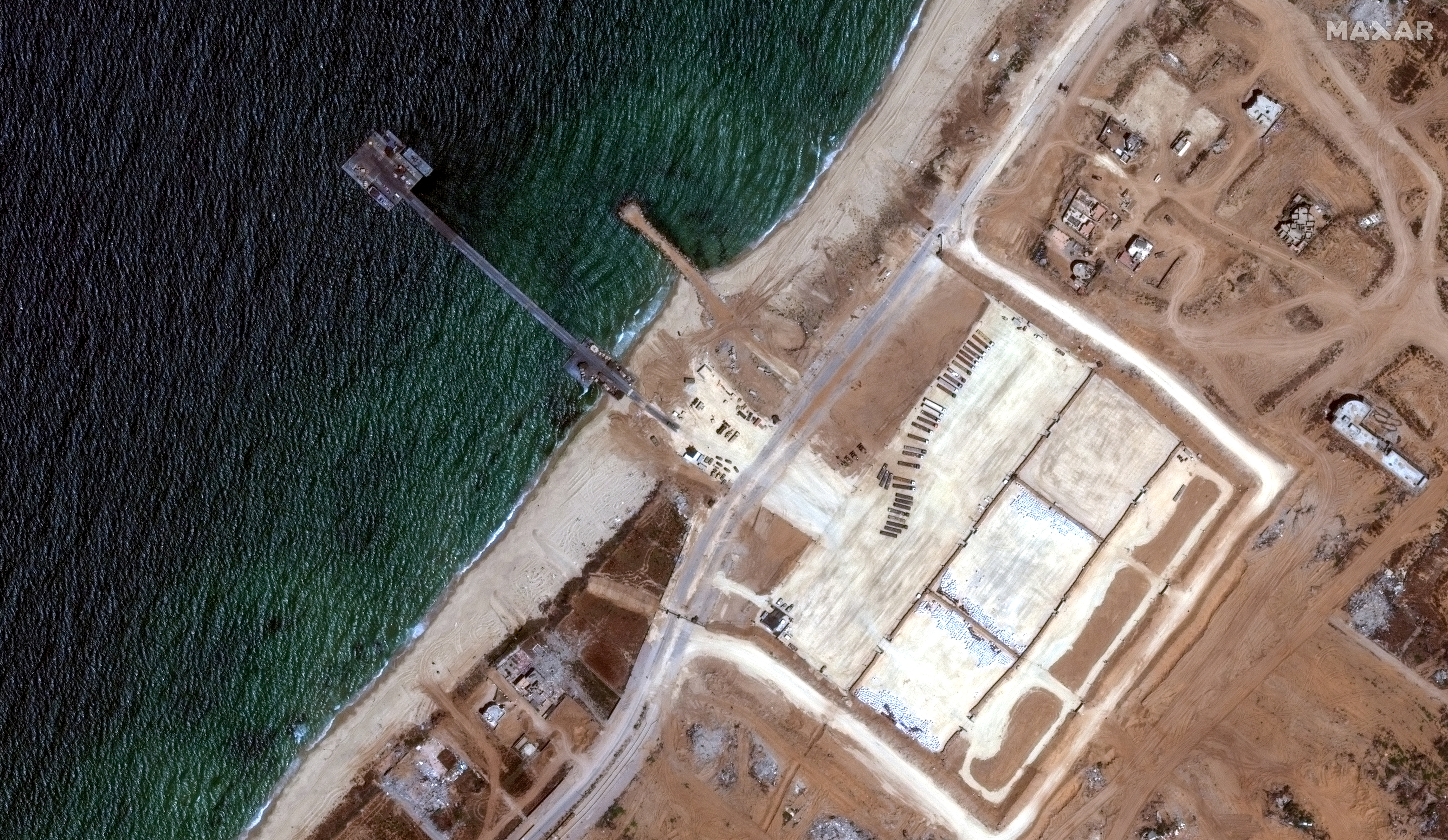The temporary jetty constructed off the coast of Gaza to facilitate the delivery of humanitarian aid sent from Cyprus has been towed away to the Israeli port of Ashdod for a second time, Pentagon spokeswoman Sabrina Singh confirmed on Tuesday.
She said the jetty is being kept in Ashdod and is expected to be taken back to Gaza later this week, though an exact date has not yet been determined.
The jetty was removed due to anticipated rough seas off the coast of Gaza, with British newspaper The Guardian having reported earlier this month that it is only operable in conditions where waves are smaller than 1.25 metres high.
This was corroborated by the United States Central Command’s deputy chief Vice Admiral Brad Cooper.
“Historically, by early September, the seas begin to rise and mother nature gets a vote here. I think we are just going to have to see what the weather looks like going forward,” he said.
This week’s removal of the jetty is the second time it has been taken to Ashdod since it was first fixed into place five weeks ago.
It had first been taken to Ashdod for repairs after breaking apart during high winds last month, while four ships which were supposed to be stabilising it washed up on a beach in the nearby Israeli town of Ashkelon.
Meanwhile, the United Nations World Food Programme is still undecided as to whether it will resume its distribution of aid arriving via the jetty when it returns to Gaza, with its security review of the situation still pending.
WFP executive director Cindy McCain had announced last week that the WFP had “paused” its distribution of humanitarian aid from the jetty, saying she was “concerned about the safety of our people” after an Israeli military operation in the area which reportedly killed over 200 Palestinians.
She added that two of the WFP’s warehouses nearby had been “rocketed”.
“We have stepped back for the moment, to make sure that we are on safe terms and on safe ground before we will restart,” she said, adding that the WFP is continuing its distribution of humanitarian aid in other parts of Gaza.
A week on, the WFP’s review is still pending, and a decision has not yet been made, with UN Under-Secretary-General for Humanitarian Affairs Martin Griffiths issuing warnings about the review’s potential findings.
“You can be damn sure we are going to be very careful about what we assess and what we conclude,” he said, adding that any finding that the Israel Defence Forces used the secure beach next to the jetty or the roads around it would “put at risk any future humanitarian engagement” connected to the jetty.
The UN secretary-general’s spokesman Farhan Haq concurred.
“Humanitarian aid must not be used and must not be perceived as taking any side in a conflict. The safety of our humanitarian workers depends on all sides and the communities on the ground trusting their impartiality,” he said.
Palestinian minister of state for foreign affairs, Varsen Aghabekian, then told the Cyprus Mail on Tuesday she believed it was perfectly possible that the area surrounding the jetty could have been used in the operation.
“We do not put it past an army that practices genocide, bombs schools, hospitals, places of worship, and even plastic tents, and aims to make Gaza uninhabitable, to exploit the port or other facilities for carrying out its criminal attacks,” she said.
She added that she was unable to confirm or deny whether the port had been used for the operation, and called for an “independent, specialised, international” investigation to verify the claims.
Despite the turmoil faced by the jetty, Sabrina Singh was keen to extol its virtues on Tuesday, saying that over 3,500 tonnes of humanitarian aid have been delivered to Gaza via the jetty, of which 2,500 tonnes was delivered after the jetty was attached for the second time earlier this month.
In addition, US Secretary of State Antony Blinken had on Monday night thanked Cyprus for its role in the implementation of the Amalthea plan, the name given to the humanitarian aid corridor, during a meeting with Cypriot Foreign Minister Constantinos Kombos.
Kombos himself had used the Amalthea plan to illustrate his view that Cyprus is “a part of a region marred by constant crises” but that the country is “part of the answer, part of the solution for the international community”.
However, some American lawmakers have already run out of patience with the jetty, with two separate amendments to the country’s annual defence policy bill having been filed with the aim of defunding it.
One was filed by Nancy Mace, a Republican from South Carolina, who described the jetty as a “logistical nightmare” with “costs far outweighing any potential benefits”.
“From a purely cost-based analysis, investing in a jetty off the coast of Gaza is an inefficient use of our defence budget … Our taxpayer dollars should be dedicated to projects which directly enhance our national security,” she said.
Support for the idea was not unanimous, however, with Democrat Betty McCollum from Minnesota appealing for funding to continue.
“Has it been as successful as we hoped it would? Absolutely not. But do you ever stop trying to provide children food? I don’t think in this country we do that,” she said.






Click here to change your cookie preferences